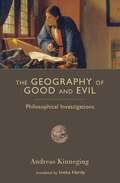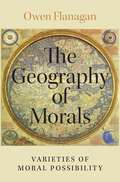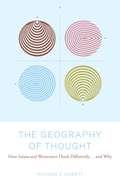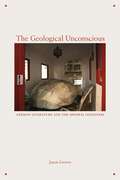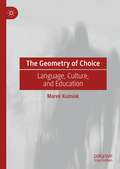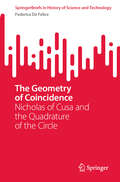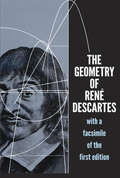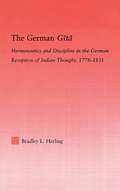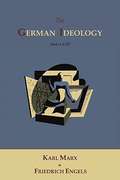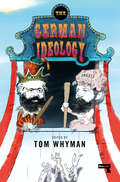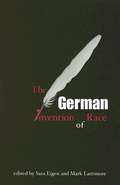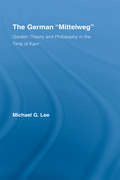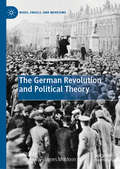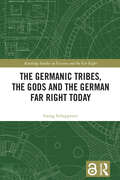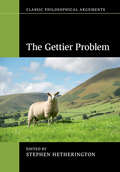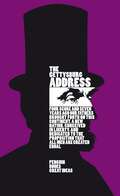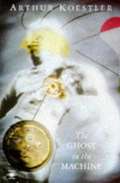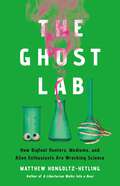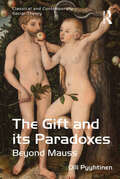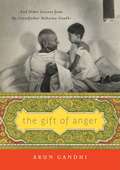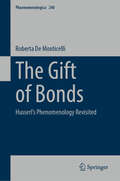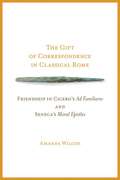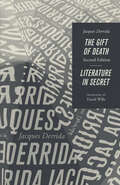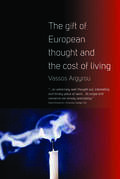- Table View
- List View
The Geography of Good and Evil: Philosophical Investigations
by Andreas KinnegingDo good and evil exist? Absolutely. In this bracing book, the eminent Dutch philosopher Andreas Kinneging turns fashionable thinking on its head, revealing how good and evil are objective, universal, and unchanging—and how they must be rediscovered in our age. In mapping the geography of good and evil, Kinneging reclaims, and reintroduces us to, the great tradition of ancient and Christian thought. Traditional wisdom enables us to address the eternal questions of good and evil that confront us in both public and private life. Though it is common to accept uncritically the blessings of modernity and its intellectual sources, the Enlightenment and Romanticism, Kinneging shows that traditional thinking is richer and more realistic. Indeed, we see how, in more than a few respects, the Enlightenment and Romanticism brought not progress but deterioration. Kinneging skillfully reformulates and defends the insights of traditional thinking for today's readers, demonstrating how an objective morality is to be understood and how we can know what morality demands of us. At a time when the traditional virtues have practically disappeared from our language (that is, all but one—"tolerance"), he lays out the foundations of virtue and vice. Ultimately, Kinneging reveals the lasting significance of these seemingly archaic notions—to our own lives, to our families, to our culture, and to civilization. This profound, award-winning work establishes Andreas Kinneging as one of our wisest moral philosophers.
The Geography of Morals: Varieties of Moral Possibility
by Owen FlanaganThe Geography of Morals is a work of extraordinary ambition: an indictment of the parochialism of Western philosophy, a comprehensive dialogue between anthropology, empirical moral psychology, behavioral economics, and cross-cultural philosophy, and a deep exploration of the opportunities for self, social, and political improvement provided by world philosophy. Flanagan presses the much more exciting possibility that cross-cultural philosophy provides opportunities for exploring the varieties of moral possibility, learning from other traditions, and for self, social, and political improvement. There are ways of world making in other living traditions - Confucian, Daoist, Buddhist, Hindu, Jain, Muslim, Amerindian,and African - that citizens in Western countries can benefit from. Cross-cultural learning is protection against what Alasdair MacIntyre refers to as being "imprisoned by one's upbringing. " Flanagan takes up perennial topics of whether there is anything to the idea of a common human nature, psychobiological sources of human morality, the nature of the self, the role of moral excellence in a good human life, and whether and how empirical inquiry into morality can contribute to normative ethics. The Geography of Morals exemplifies how one can respectfully conceive of multiculturalism and global interaction as providing not only opportunities for business and commerce, but also opportunities for socio-moral and political improvement on all sides. This is a book that aims to change how normative ethics and moral psychology are done.
The Geography of Thought
by Richard NisbettEveryone knows that while different cultures may think about the world differently, they use the same equipment for doing their thinking. Everyone knows that whatever the skin color, nationality, or religion, every human being uses the same tools for perception, for memory, and for reasoning. Everyone knows that a logically true statement is true in English, German, or Hindi. Everyone knows that when a Chinese and an American look at the same painting, they see the same painting.But what if everyone is wrong?When psychologist Richard E. Nisbett showed an animated underwater scene to his American students, they zeroed in on a big fish swimming among smaller fish. Japanese subjects, on the other hand, made observations about the background environment -- and the different "seeings" are a clue to profound underlying cognitive differences between Westerners and East Asians. For, as Professor Nisbett shows in The Geography of Thought, people actually think about -- and even see -- the world differently because of differing ecologies, social structures, philosophies, and educational systems that date back to ancient Greece and China and that have survived into the modern world. As a result, East Asian thought is "holistic" -- drawn to the perceptual field as a whole and to relations among objects and events within that field. By comparison to Western modes of reasoning, East Asian thought relies far less on categories or on formal logic; it is fundamentally dialectic, seeking a "middle way" between opposing thoughts. By contrast, Westerners focus on salient objects or people, use attributes to assign them to catergories, and apply rules of formal logic to understand their behavior. The Geography of Thought documents Professor Nisbett's groundbreaking international research in cultural psychology, a series of comparative studies both persuasive in their rigor and startling in their conclusions, addressing questions such as: Why did the ancient Chinese excel at algebra and arithmetic, but not geometry, the brilliant achievement of such Greeks as Euclid? Why do East Asians find it so difficult to disentangle an object from its surroundings? Why do Western infants learn nouns more rapidly than verbs, when it is the other way around in East Asia? What are the implications of these cognitive differences for the future of international politics? Do they support a Fukuyamaesque "end of history" scenario or a Huntingtonian "clash of civilizations"?From feng shui to metaphysics, from comparative linguistics to economic history, a gulf separates the children of Aristotle from the descendants of Confucius. At a moment in history when the need for cross-cultural understanding and collaboration have never been more important, The Geography of Thought offers both a map to that gulf and a blueprint for a bridge that might be able to span it.
The Geography of Thought: How Asians and Westerners Think Differently... and Why
by Richard E. NisbettWhen psychologist Richard E. Nisbett showed an animated underwater scene to his American students, they zeroed in on a big fish swimming among smaller fish. Japanese observers instead commented on the background environment -- and the different "seeings" are a clue to profound cognitive differences between Westerners and East Asians. As Nisbett shows in The Geography of Thought, people think about -- and even see -- the world differently because of differing ecologies, social structures, philosophies, and educational systems that date back to ancient Greece and China. The Geography of Thought documents Professor Nisbett's groundbreaking research in cultural psychology, addressing questions such as: Why did the ancient Chinese excel at algebra and arithmetic, but not geometry, the brilliant achievement of such Greeks as Euclid? Why do East Asians find it so difficult to disentangle an object from its surroundings? Why do Western infants learn nouns more rapidly than verbs, when it is the other way around in East Asia? At a moment in history when the need for cross-cultural understanding and collaboration have never been more important, The Geography of Thought offers both a map to that gulf and a blueprint for a bridge that might be able to span it.
The Geological Unconscious: German Literature and the Mineral Imaginary
by Jason GrovesAlready in the nineteenth century, German-language writers were contending with the challenge of imagining and accounting for a planet whose volatility bore little resemblance to the images of the Earth then in circulation. The Geological Unconscious traces the withdrawal of the lithosphere as a reliable setting, unobtrusive backdrop, and stable point of reference for literature written well before the current climate breakdown.Through a series of careful readings of romantic, realist, and modernist works by Tieck, Goethe, Stifter, Benjamin, and Brecht, Groves elaborates a geological unconscious—unthought and sometimes actively repressed geological knowledge—in European literature and environmental thought. This inhuman horizon of reading and interpretation offers a new literary history of the Anthropocene in a period before it was named.These close readings show the entanglement of the human and the lithic in periods well before the geological turn of contemporary cultural studies. In those depictions of human-mineral encounters, the minerality of the human and the minerality of the imagination become apparent. In registering libidinal investments in the lithosphere that extend beyond Carboniferous deposits and beyond any carbon imaginary, The Geological Unconscious points toward alternative relations with, and less destructive mobilizations of, the geologic.
The Geometry of Choice: Language, Culture, and Education
by Marek KuźniakThis book offers a cognitive-semantic insight into the roots of the human decisionmaking process, using the metaphor of CHOICE as CUBE. The areas of key interest are language, culture, and education as forms of social organization. This book addresses issues relevant to a number of fields, including social epistemology, cognitive linguistics, cognitive anthropology, philosophy, culture and education studies, and will be of interest to readers in these and related disciplines.
The Geometry of Coincidence: Nicholas of Cusa and the Quadrature of the Circle (SpringerBriefs in History of Science and Technology)
by Federica De FeliceThis book offers a contribution to our understanding of Nicholas of Cusa&’s theory of geometry. It is based not only on his—generally more famous—philosophical texts (e.g., De docta ignorantia, Idiota, etc.), but also, and more significantly, on the strictly speaking mathematical texts drafted between 1445 and 1459, where Cusanus attempts to provide a solution to the vexata quaestio of the squaring of the circle. First critically edited in 2010—and translated into Italian by the author in 2020—Cusanus&’ Scripta mathematica are here scrutinized as to their context, genesis, and content, in order to shed light, on the one hand, on the philosophical and theological motives behind Cusanus&’ mathematical endeavours; and, on the other hand, on the scope and limits of Cusanus&’ geometrical constructive attempts to reach &“mathematical perfection&”. In addition to providing a scrupulous survey of Cusanus&’ sources on mathematics, this book focuses on a little explored aspect in Cusanus&’ work, namely his original theory of geometrical space as men&’s space, where the activity of mensurare takes place, establishing relations of continuous proportionality to the original unity. In conclusion, the author provides an extensive account on the reception of Cusanus&’ mathematical texts, from their early dissemination to the reactions of several thinkers throughout history, ensuring a full and rounded overview of Cusanus&’ work in geometry, mathematics, and philosophy.
The Geometry of René Descartes: with a Facsimile of the First Edition
by René DescartesThis is an unabridged republication of the definitive English translation of one of the very greatest classics of science. Originally published in 1637, it has been characterized as "the greatest single step ever made in the progress of the exact sciences" (John Stuart Mill); as a book which "remade geometry and made modern geometry possible" (Eric Temple Bell). It "revolutionized the entire conception of the object of mathematical science" (J. Hadamard).With this volume Descartes founded modern analytical geometry. Reducing geometry to algebra and analysis and, conversely, showing that analysis may be translated into geometry, it opened the way for modern mathematics. Descartes was the first to classify curves systematically and to demonstrate algebraic solution of geometric curves. His geometric interpretation of negative quantities led to later concepts of continuity and the theory of function. The third book contains important contributions to the theory of equations.This edition contains the entire definitive Smith-Latham translation of Descartes' three books: Problems the Construction of which Requires Only Straight Lines and Circles; On the Nature of Curved Lines; and On the Construction of Solid and Supersolid Problems. Interleaved page by page with the translation is a complete facsimile of the 1637 French text, together with all Descartes' original illustrations; 248 footnotes explain the text and add further bibliography.
The German Gita: Hermeneutics and Discipline in the Early German Reception of Indian Thought
by Bradley L. HerlingHow did the Bhagavadgãtà first become an object of German philosophical and philological inquiry? How were its foundational concepts initially interpreted within German intellectual circles, and what does this episode in the history of cross-cultural encounter teach us about the status of comparative philosophy today? This book addresses these questions through a careful study of the figures who read, translated and interpreted the Bhagavadgãtà around the turn of the nineteenth century in Germany: J.G. Herder, F. Majer, F. Schlegel, A.W. Schlegel, W. von Humboldt, and G.W.F. Hegel. Methodologically, the study attends to the intellectual contexts and prejudices that framed the early reception of the text. But it also delves deeper by investigating the way these frameworks inflected the construction of the Bhagavadgãtà and its foundational concepts through the scholarly acts of excerpting, anthologization, and translation. Overall, the project contributes to the pluralization of Western philosophy and its history while simultaneously arguing for a continued critical alertness in cross-cultural comparison of philosophical and religious worldviews.
The German Ideology
by Friedrich Engels Karl Marx2011 Reprint of 1939 Edition. Parts I & III of "The German Ideology". Full facsimile of the original edition, not reproduced with Optical Recognition Software. Originally published by the Marx-Engels Institute in Moscow in 1939. "The German Ideology" was written by Karl Marx and Friedrich Engels circa 1846, but published later. The original edition was divided into three parts. Part I, the most significant, is perhaps the classic statement of the Marxist theory of history and his much cited "materialist conception of history". Since its first publication, Marxist scholars have found Part I "The German Ideology" particularly valuable since it is perhaps the most comprehensive statement of Marx's theory of history stated at such length and detail. Part II consisted of many satirically written polemics against Bruno Bauer, other Young Hegelians, and Max Stirner. These polemical and highly partisan sections of the "German Ideology" have not been reproduced in this edition. We reprint Parts I & Parts III only. Part III treats Marx & Engels' conception of true socialism and is reprinted in its entirety. Part II has not been reprinted in this edition in order to produce a small and inexpensive book which contains the gist of the "German Ideology". Appendix contains the "Theses on Feuerbach." Index of authors, with scholarly citations and footnotes.
The German Ideology: A New Abridgement
by Karl MarxA new abridgement of Marx and Engels&’s 1846 reckoning with the philosophical tradition, edited and with an introduction by philosopher Tom Whyman.Edited and with an introduction by philosopher Tom Whyman, this new abridged version The German Ideology sheds new light on one of the most difficult, disputed texts in Marx&’s oeuvre.Written in 1846 and subsequently abandoned by Marx and Engels, only to be rescued in the 1930s by researchers in the USSR, The German Ideology is the high point of Marx&’s philosophical thought: a brilliantly insightful, still thrillingly radical work of materialist philosophical therapy. Yet there remains no wholly satisfactory stand-alone version in English, with only a heavily abridged 1970 edition edited by C.J. Arthur, or a facsimile edition taken from Vol. 5 of the Marx-Engels Collected Works, which does not include satisfactory scholarly notes, currently available. In this new Repeater Classics edition, Tom Whyman seeks to remedy this. By expanding on generally-available abridgements to include the bulk of the section on Max Stirner, as well as amending the translation, adding notes and providing a new critical introduction, this new edition of The German Ideology will allow non-specialists to engage with this critical work for the first time. At a time when interest in Marx's work is increasing, as people look for an alternative to our currently failing political system, this new edition of The German Ideology will bring Marx's most substantial vision of what communism might actually be like to a whole new audience.
The German Invention of Race (SUNY Series, Philosophy and Race)
by Mark Larrimore Sara EigenIlluminates the emergence of race as a central concept in philosophy and the social sciences.
The German Mittelweg: Garden Theory and Philosophy in the Time of Kant
by Michael G. LeeIn the 1790s, a close-knit group of German philosophers published several garden theory texts. These works are unique in that a close-knit group of philosophers had never before--and has not since--produced so many works on the topic of garden design. In essence, this cohort sought to imbue the most visionary concepts that had been inherited from the German garden tradition with the intellectual resources that were newly available through Kant’s critical philosophy. The most important of these concepts was the prescription for a new Mittelweg, or "middle path," garden that would mediate between the perceived excesses of French formalism and the English picturesque. In close analysis, the author demonstrates that Kant used similar "middle path" techniques in the design of his own "critical path" between dogmatism and skepticism. This similarity is most apparent when he uses topographical metaphors to describe the organizational principles of his system. By interpreting Kant’s topographical metaphors in relation to contemporary garden theories, this book offers new insights into the structural similarities between his "critical path" and the German garden’s "middle path" between French formalism and the English picturesque.
The German Revolution and Political Theory (Marx, Engels, and Marxisms)
by James Muldoon Gaard KetsThis book is the first collection within political theory to examine the ideas and debates of the German Revolution of 1918/19. It discusses the political theorists and actors of the revolution and uncovers an incredibly fertile body of political thought. Revolutionary events led to the proliferation of new political strategies, theoretical insights and institutional proposals. Key questions included the debate between a national assembly and a council system, the socialisation of the economy, the development of new forms of political representation and the proper role of parliaments, political parties and trade unions. This book offers novel perspectives on the history of the revolution, a thorough engagement with its main thinkers and an analysis of its relevance for contemporary political thought.
The Germanic Tribes, the Gods and the German Far Right Today (Routledge Studies in Fascism and the Far Right)
by Georg SchuppenerThe Germanic Tribes, the Gods and the German Far Right Today deals with the question of how right-wing extremists in German-speaking countries adapt and adopt elements from the history, culture, and mythology of the Germanic tribes. It provides the first in-depth study of the adoption of these historical motifs by right-wing extremists. Using linguistic and historical perspectives, and drawing on both publicly accessible material and sources gathered by the intelligence services, the book delineates the influence and impact of Germanic tribal history and culture within extremist subcultures. The author demonstrates that references to the Germanic peoples, their history, culture, and mythology, are even more widespread among contemporary right-wing extremists than they were in the interwar National Socialist era. This book will be of interest to researchers of right-wing extremism, German politics, and social movements.
The Gettier Problem (Classic Philosophical Arguments)
by Stephen HetheringtonWhen philosophers try to understand the nature of knowledge, they have to confront the Gettier problem. This problem, set out in Edmund Gettier's famous paper of 1963, has yet to be solved, and has challenged our best attempts to define what knowledge is. This volume offers an organised sequence of accessible and distinctive chapters explaining the history of debate surrounding Gettier's challenge, and where that debate should take us next. The chapters describe and evaluate a wide range of ideas about knowledge that have been sparked by philosophical engagements with the Gettier problem, including such phenomena as fallibility, reasoning, evidence, reliability, truth-tracking, context, luck, intellectual virtue, wisdom, conceptual analysis, intuition, experimental philosophy, and explication. The result is an authoritative survey of fifty-plus years of epistemological research - along with provocative ideas for future research – into the nature of knowledge.
The Gettysburg Address: The Constitution Of The United States Of America, The Declaration Of Independence, Lincoln's Gettysburg Address (Penguin Great Ideas Ser.)
by Abraham LincolnThe Address was delivered at the dedication of the Soldiers' National Cemetery in Gettysburg, Pennsylvania, on the afternoon of Thursday, November 19, 1863, during the American Civil War, four and a half months after the Union armies defeated those of the Confederacy at the decisive Battle of Gettysburg. In just over two minutes, Lincoln invoked the principles of human equality espoused by the Declaration of Independence and redefined the Civil War as a struggle not merely for the Union, but as "a new birth of freedom" that would bring true equality to all of its citizens, and that would also create a unified nation in which states' rights were no longer dominant.Throughout history, some books have changed the world. They have transformed the way we see ourselves - and each other. They have inspired debate, dissent, war and revolution. They have enlightened, outraged, provoked and comforted. They have enriched lives - and destroyed them. Now Penguin brings you the works of the great thinkers, pioneers, radicals and visionaries whose ideas shook civilization and helped make us who we are.
The Ghost In The Machine
by Arthur Koestlerfrom the book's back cover: In The Sleepwalkers and The Act of Creation Arthur Koestler provided pioneering studies of scientific discovery and artistic inspiration, the twin pinnacles of human achievement. The Ghost in the Machine looks at the dark side of the coin: our terrible urge to self-destruction... Could the human species be a gigantic evolutionary mistake? To answer that startling question Koestler examines how experts on evolution and psychology all too often write about people with an 'antiquated slot-machine model based on the naively mechanistic world-view of the nineteenth century'. His brilliant polemic helped to instigate a major revolution in the life sciences, yet its 'glimpses of an alternative world-view' form only the background to an even more challenging analysis of the human predicament. Perhaps, he suggests, we are a species in which ancient and recent brain structures - or reason and emotion -- are not fully co-ordinated. Such in-built deficiencies may explain the paranoia, violence and insanity that are central strands of human history. And however disturbing we find such issues, Koestler contends, it is only when we face our limitations head-on that we can hope to find a remedy.
The Ghost Lab: How Bigfoot Hunters, Mediums, and Alien Enthusiasts Are Wrecking Science
by Matthew Hongoltz-HetlingA surprising and compelling journey into the business of paranormal investigation, and the state of scientific literacy in America. In 2010, a sleepy small-town business plaza in rural New Hampshire rented space to an unusual tenant: a ghost laboratory. The Kitt Research Initiative&’s mission was to use the scientific method to document the existence of spirits. Founder Andy Kitt was known as a straight-shooter; and was unafraid — perhaps eager — to offend other paranormal investigators by exposing the fraudulence of their less advanced techniques. Kitt&’s efforts attracted flocks of psychics, alien abductees, witches, mediums, ghost hunters, UFOlogists, cryptozoologists and warlocks from all over New England, and the world. And there were plenty of them around.The Ghost Lab tells the astonishing story of the wild ecosystem of paranormal profiteers and consumers. But it also reveals how the twin scourges of declining scientific literacy and eroding trust in institutions have created space for armies of pseudoscientists to step into the minds of an increasingly credulous public. With his distinct voice, eye for a story and ability to show how one community's experience reflects that of a society, Matt Hongoltz-Hetling crafts a powerful narrative about just how fragmented our understanding of what is real--and what is not--has become.
The Gift and its Paradoxes: Beyond Mauss (Classical and Contemporary Social Theory)
by Olli PyyhtinenBringing social theory and philosophy to bear on popular movies, novels, myths, and fairy tales, The Gift and its Paradoxes explores the ambiguity of the gift: it is at once both a relation and a thing, alienable and inalienable, present and poison. Challenging the nature of giving as reciprocal, the book engages critically with the work of Mauss and develops a new theory of the gift according to which the gift cannot be reduced to a model of exchange, but must instead entail a loss or sacrifice. Ultimately, the gift is examined in the book as the impossible occurrence of gratuitous giving. In addition to exploring the conditions of possibility and impossibility of the gift, the book draws on the thought of figures such as Derrida, Serres, Simmel, Cixous, Irigaray and Heidegger to argue for the relevance of the phenomenon of the gift to broader issues in contemporary social sciences. It takes up questions concerning the constitution of community and the processes by which people are included in or excluded from it, gender relations, materiality, the economy, and the possibility that death itself could be a gift, in the form of euthanasia or self-sacrifice. A rigorous yet accessible examination of the phenomenon of the gift in relation to a range of contemporary concerns, The Gift and its Paradoxes will appeal to scholars and students within sociology, philosophy, anthropology, political theory and film and literature studies.
The Gift of Anger: And Other Lessons from My Grandfather Mahatma Gandhi
by Arun GandhiDiscover ten vital and extraordinary life lessons from one of the most important and influential philosophers and peace activists of the twentieth century—Mahatma Gandhi—in this poignant and timely exploration of the true path from anger to peace, as recounted by Gandhi’s grandson, Arun Gandhi. In the current troubled climate, in our country and in the world, these lessons are needed more than ever before.“We should not be ashamed of anger. It’s a very good and a very powerful thing that motivates us. But what we need to be ashamed of is the way we abuse it.” —Mahatma Gandhi Arun Gandhi was just twelve years old when his parents dropped him off at Sevagram, his grandfather’s famous ashram. To Arun, the man who fought for India’s independence and was the country’s beloved preeminent philosopher and leader was simply a family member. He lived there for two years under his grandfather’s wing until Gandhi’s assassination. While each chapter contains a singular, timeless lesson, The Gift of Anger also takes you along with Arun on a moving journey of self-discovery as he learns to overcome his own struggle to express his emotions and harness the power of anger to bring about good. He learns to see the world through new eyes under the tutelage of his beloved grandfather and provides a rare, three-dimensional portrait of this icon for the ages. The ten vital life lessons strike a universal chord about self-discovery, identity, dealing with anger, depression, loneliness, friendship, and family—perfect for anyone searching for a way to effecting healing change in a fractured world.
The Gift of Bonds: Husserl's Phenomenology Revisited (Phaenomenologica #240)
by Roberta de MonticelliThis book presents the idea of the gift of bonds as the core intuition of phenomenology, constituting it into that method of philosophical research that Husserl had in mind when he characterized phenomenology as the culmination and fulfillment of Western philosophy. The book clarifies this claim while offering a unitary key to the whole of Husserl's published and posthumous work. The idea of the gift of bonds unfolds progressively as a key to understanding the related notions of essence, material apriori, non-empirical data, structure, ideality, and value. By unveiling the “unitary foundation”, the key concept discussed in the Third Logical Investigation, the present book presents this central notion as capturing the very idea of concreteness, as experienced and phenomenologically described in terms of qualitative “plena”, and the not less important class of ideal or abstract objects. The author takes this concept to be the core theoretical idea of the entire phenomenomenological approach to reality and philosophical research, and argues for this claim in chapters IV-V as it remains a leading thread throughout all chapters of this book. This book appeals to students and researchers working in phenomenology.
The Gift of Correspondence in Classical Rome
by Amanda WilcoxAmanda Wilcox offers an innovative approach to two major collections of Roman letters—Cicero’sAd Familiaresand Seneca’sMoral Epistles—informed by modern cross-cultural theories of gift-giving. By viewing letters and the practice of correspondence as a species of gift exchange, Wilcox provides a nuanced analysis of neglected and misunderstood aspects of Roman epistolary rhetoric and the social dynamics of friendship in Cicero’s correspondence. Turning to Seneca, she shows that he both inherited and reacted against Cicero’s euphemistic rhetoric and social practices, and she analyzes how Seneca transformed the rhetoric of his own letters from an instrument of social negotiation into an idiom for ethical philosophy and self-reflection. Though Cicero and Seneca are often viewed as a study in contrasts, Wilcox extensively compares their letters, underscoring Cicero’s significant influence on Seneca as a prose stylist, philosopher, and public figure.
The Gift of Death, Second Edition & Literature in Secret (Religion And Postmodernism Ser.)
by Jacques Derrida“An important contribution to the critical study of ethics . . . [for those] made curious by the controversy that . . . attends Derrida.” —Booklist, on the first editionThe Gift of Death, Jacques Derrida’s most sustained consideration of religion, explores questions first introduced in his book Given Time about the limits of the rational and responsible that one reaches in granting or accepting death, whether by sacrifice, murder, execution, or suicide. Derrida analyzes Czech philosopher Jan Patocka’s Heretical Essays in the Philosophy of History and develops and compares his ideas to the works of Heidegger, Lévinas, and Kierkegaard. One of Derrida’s major works, The Gift of Death resonates with much of his earlier writing, and this highly anticipated second edition is greatly enhanced by David Wills’s updated translation. This new edition also features the first-ever English translation of Derrida’s Literature in Secret. In it, Derrida continues his discussion of the sacrifice of Isaac, which leads to bracing meditations on secrecy, forgiveness, literature, and democracy. He also offers a reading of Kafka’s Letter to His Father and uses the story of the flood in Genesis as an embarkation point for a consideration of divine sovereignty.
The Gift of European Thought and the Cost of Living
by Vassos ArgyrouEuropean thought is often said to be a gift to the rest of the world, but what if there is no gift as such? What if there is only an economy where every giving is also a taking, and every taking is also a giving? This book extends the question of economies by making a case for an "economy of thought" and a "political economy." It argues that all thinking and doing presupposes taking, and therefore giving, as the price to pay for taking; or that there exists a "cost of living," which renders the idea of free thinking and living untenable. The argument is developed against the Enlightenment directive to think for oneself as the means of becoming autonomous and shows that this "light," given to the rest of the world as a gift, turns out to be nothing.
